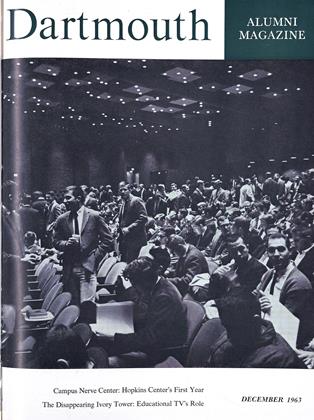HANOVER was a hushed and heartsick town during the three days following the shocking death of President John F. Kennedy. Although three thousand students were in residence, the campus and streets were empty, almost deserted, and an unnatural silence was everywhere. The American flag at half-mast flapped in a cold wind that sharpened the College's spiritual chill.
President Kennedy had special bonds of understanding with young Americans; he was of their time and embodied their hopes for social sanity and world peace. College students genuinely and openly lamented his death. At Dartmouth, hundreds of them filled Rollins Chapel for a special memorial service on Sunday afternoon, November 24, conducted by President Dickey and the Rev. George H. Kalbfleisch, director of undergraduate religious life.
In his brief memorial address, President Dickey said:
We gather at one of those moments when as men we know both the futility of words and the need of speaking to each other and to the mystery of the universe.
It is natural that at such moments we speak mainly through forms and words which have borne the weight of man's grief and perplexity over the ages. And yet when a leader who personified for all the promises of one of the greatest nations and for millions even the hopes of life, is shot dead in the street, in our midst, we must not expect the past to say all that needs to be said. If we are worthy of being the instruments of a divine will, we surely have great need today and for many a tomorrow to permit this senseless tragedy, this perversion of all that civilized man pretends to be, to make us aware how precarious our hold is on our senses, in truth on our vaunted humanity.
Such an act can rarely, if ever, be understood and dismissed as merely the crime or madness of a man, although it is surely a monstrous monument to one or the other of these aberrations. As we look back over the history of such happenings, we cannot escape knowing that whatever else was involved, such happenings are a judgment on their time and indeed on all men.
Let us at this moment only ask for ourselves that out of this awful thing we and other men who presume to be called civilized may be made a little more aware of where our own hatreds and hostilities may lead not merely us but others as well.
I shall not presume to speak to you of the President whose life has been taken as the price of his leadership of our Nation. May we not simply say here in unmeasured tribute that he was a man of his time who as a leader of men brought to his duty and to his death the timeless virtue of bravery.
All classes were called off and all offices closed on Monday, the official day of national mourning. On Friday, only a few hours after news of President Kennedy's assassination was known, the Dartmouth-Princeton football game of the next day was cancelled by joint decision of President Goheen of Princeton and President Dickey. The game was rescheduled for one week later, on November 30. All public events on the College calendar, including a Friday night musical program in Hopkins Center, were quickly cancelled for the three-day period. Without precedent perhaps in its long history, Dartmouth College while in session came to a virtual standstill.
Palaeopitus, on behalf of Dartmouth undergraduates, sent a letter of condolence to President Kennedy's widow and a contribution of $250 to The National Association of Mental Health, a charity in which the late President was inter- ested. It also sent a letter to President Lyndon B. Johnson, expressing confidence in his leadership.
 View Full Issue
View Full Issue
More From This Issue
-
 Feature
FeatureThe Disappearing Ivory Tower
December 1963 By SAMUEL B. GOULD -
 Feature
FeatureHORNING: Invention of the Devil
December 1963 By HAROLD BRAMAN '21 -
 Feature
FeatureCAMPUS NERVE CENTER
December 1963 -
 Article
ArticleTHE UNDERGRADUATE CHAIR
December 1963 By DAVE BOLDT '63 -
 Class Notes
Class Notes1931
December 1963 By WILLARD C. "SHEP" WOLFF, JOHN K. BENSON -
 Class Notes
Class Notes1930
December 1963 By WALLACE BLAKEY, HARRISON F. CONDON JR







